It’s not often, when you watch an important tennis match, that you feel as if one of the players simply can’t lose. Rafael Nadal at the French Open, Pete Sampras at Wimbledon, Serena Williams in most of her Grand Slam finals: Even in this era of top-down dominance, the list of “mortal locks” is a short one.
For me, it got a little longer during the 2015 Davis Cup final. From the first ball he hit on Friday to the last ball he hit on Sunday—which happened to be a perfect backhand lob—I never felt the slightest doubt that Andy Murray was going to win all three of his matches against the host Belgian team, and lead Great Britain to its first Davis Cup title since 1936.
That may sound hard to believe, especially for British fans inured to Davis Cup defeat. As brilliant as he can be, the mad and often-maddening Murray has never inspired a calm sense of confidence in his supporters. Yet all through 2015, whenever he played for his country, Murray had checked his emotional baggage at the arena door and set about erecting an impenetrable fortress made up of timely serves, potent returns, ridiculous gets, heavy topspin ground strokes, and running crosscourt forehands hit at seemingly impossible angles. On the one hand, Murray made it all look easy; he lost just two sets in eight Davis Cup singles matches in 2015. On the other hand, Murray dug deeper, over a longer period, than he ever has in his career. The fact that he was supposed to beat—had to beat—each of his opponents only added to the pressure.
Murray dug deep again this weekend in Ghent, Belgium, and as expected, his fortress of versatility held firm three more times. When his last, running lob cleared the low ceiling inside the Flanders Expo Arena, and then cleared a helpless David Goffin for a winner, he had completed the first 11-0 season in Davis Cup since John McEnroe went 12-0 in 1981. Murray, not unlike a young Johnny Mac, ranted and raved his way through Ghent, but he won both of his singles matches in straight sets, and the doubles with his brother, Jamie, in four. This time, the emotion that can distract and exhaust him was all channeled in the right, winning direction.

